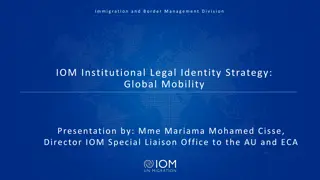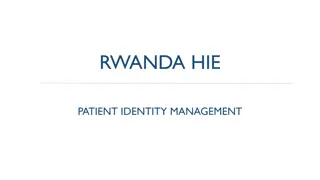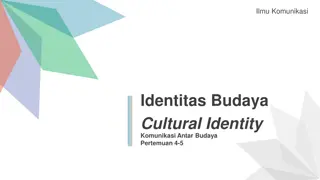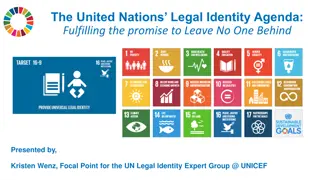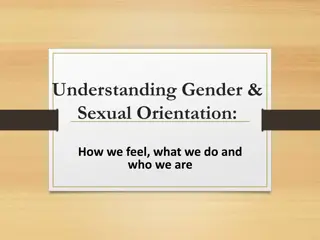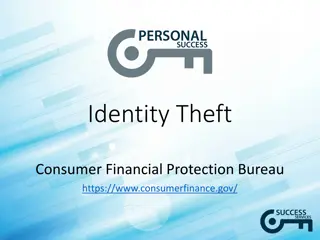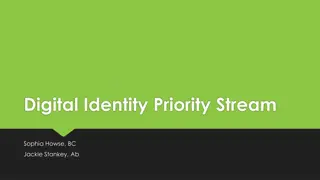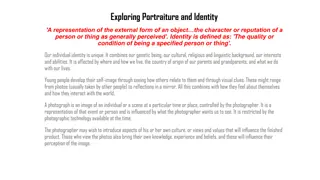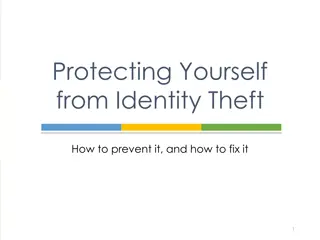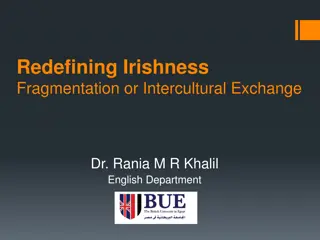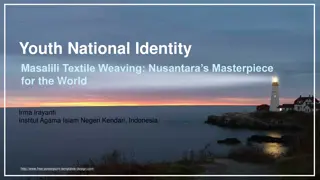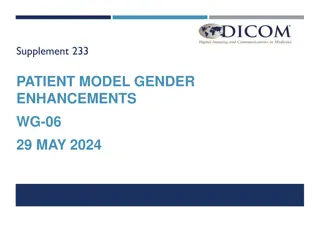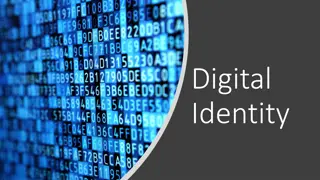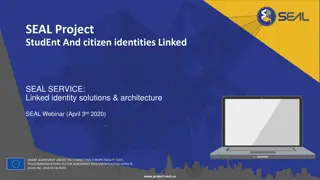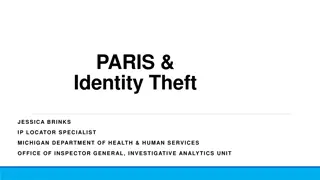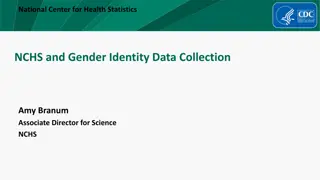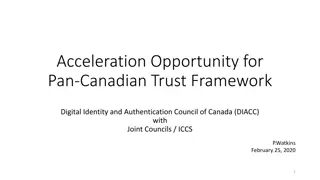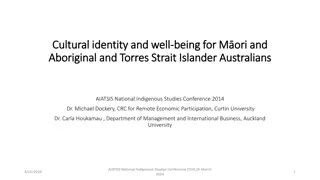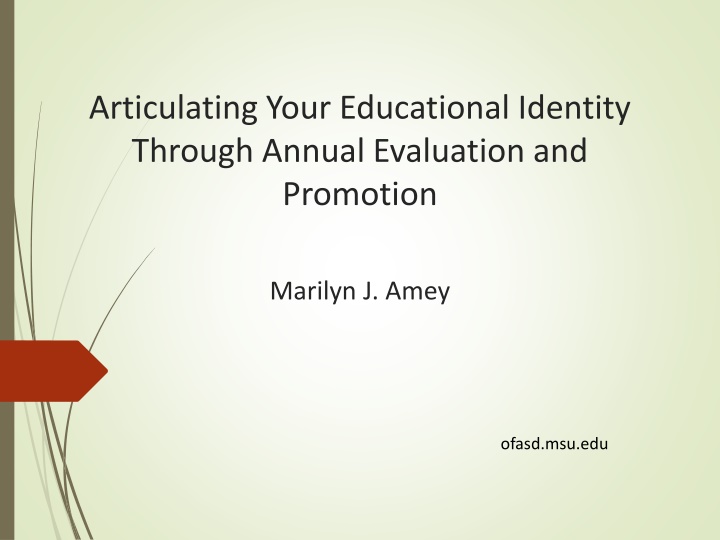
Developing Your Educational Identity: Strategies for Annual Evaluation and Promotion
Enhance your educational identity through annual evaluation and promotion by defining expectations, setting goals, receiving feedback, and showcasing accomplishments. Prepare a comprehensive portfolio including a CV, reflective essay, and evidence of excellence in assigned duties.
Download Presentation

Please find below an Image/Link to download the presentation.
The content on the website is provided AS IS for your information and personal use only. It may not be sold, licensed, or shared on other websites without obtaining consent from the author. If you encounter any issues during the download, it is possible that the publisher has removed the file from their server.
You are allowed to download the files provided on this website for personal or commercial use, subject to the condition that they are used lawfully. All files are the property of their respective owners.
The content on the website is provided AS IS for your information and personal use only. It may not be sold, licensed, or shared on other websites without obtaining consent from the author.
E N D
Presentation Transcript
Articulating Your Educational Identity Through Annual Evaluation and Promotion Marilyn J. Amey ofasd.msu.edu
Clarity regarding defined expectations, goals, & associated evaluation measures, including what you desire/expect from the position/career and plan for self- reflection and regular, confidential feedback & assessment Familiarity with institutional/unit goals & aspirations including diversity, equity & inclusion and strategic planning initiatives Self-awareness about strengths and weaknesses and ability (and desire) to receive constructive feedback Support for professional development and developing networks Respect as a colleague Personal interest in and support for your goals Defining Success: Expectations and Contributions
Current curriculum vita Reflective essay about accomplishments over the reporting period and vison for the future (5 page maximum) A representative sample of scholarly work if applicable, and Evidence of excellence in performing assigned duties, (e.g., significance, impact, and innovation of research/creative activities, instructional activities, and/or service) enumerated in the Progress and Excellence Form. Materials to be Included:
Because of the diverse assignments of fixed term faculty, unit administrators must prepare a description of the candidate s assignment including, for example, the percentage of the appointment devoted to research/creative activities, teaching, outreach, etc. Additional Points: External review letters may be used, to the extent relevant, following the principles in the policy, "External Letters of Reference."
Helps make the case for who you are, what you have accomplished, why it is important, and your expected future trajectory Telling Your Story Including Documentation But You can t document what you don t remember You can t document what you don t have evidence to support
All aspects of your work related to your assigned duties, and all the extra responsibilities you take on. Typically, organize your documents around three key categories, to the extent appropriate: Teaching Research What Should You Document? Service and/or Outreach and/or Engagement The synergies and connections across the components of your work The impact you are making [to and for whom] Your path to date and what might come next
Your philosophy and approach Your intended learning outcomes for students Your teaching methods and rationale for them What Should You Document? Instruction, Advising Approaches and innovations you developed Impact on students: outcomes assessment, unsolicited comments, creating inclusive learning environments How you interpret and respond to teaching feedback/evaluations, efforts used to improve your teaching What opportunities you take to improve/focus on your teaching How your teaching has changed over time and why (e.g., Covid impact, hybrid & online instruction)
Why are you pursuing the work you do? To what end? With whom are you intending to be in conversation? What are your key questions of interest? Research, Scholarly, & Creative Activities Including grants and works submitted/under review or revision What Should You Document? Research, Scholarship, Creative Activities Exhibits, performances, media, reports Contributions to the Field Manuscript reviews, conference proposal reviews Editorial boards &Grant evaluation panels Leadership activities in professional societies Invited talks and activities Awards and honors
For the University/Unit Department, college, university leadership and committee roles including peer review committees Task forces and reports For Professional Organizations What Should You Document? Outreach/ Service/ Engagement Leadership roles elected and appointed; Committee memberships Conferences/events planned For the Broader Community: Consultation and technical assistance to organizations/groups; Publications and resource materials for the public and audiences outside your field Interpretations of technical information for the public; Expert testimony Development of programs in educational/cultural organizations Clinical Work: Diagnosis and treatment of clients and patients Supervision of staff in clinical settings Awards and Recognitions
Describe how you contribute to the missions of MSU (relative to your assignment) and society more broadly; impact and broader context should be explained If research/creative activities is a part of your assignment, then highlight what you have done and where you are going Make a coherent trajectory clear Tell a story about your vision and progress toward it Reflective Essay It Should Be a polished document that includes some specific examples but doesn t just repeat your CV Communicate at a level appropriate for knowledgeable people who are not in your discipline
Get information from senior colleagues and unit leaders about the culture in your department and college regarding style and content of the document. Review examples from successful promotion cases. Start early and have others review it. Proof it Reflective Essay Advice
Adams Academy and Lilly Fellows Learning Communities Academic Lunch and Learns All University Awards Committees & Recognitions Exploring Academic Leadership lunches Office of Faculty & Academic Staff Development Select Key Opportunities for Fixed-Term Faculty National Center for Faculty Development and Diversity Women s Networking Association (MSU WorkLife Office) Michigan American Council on Education Women s Network https://ofasd.msu.edu/

